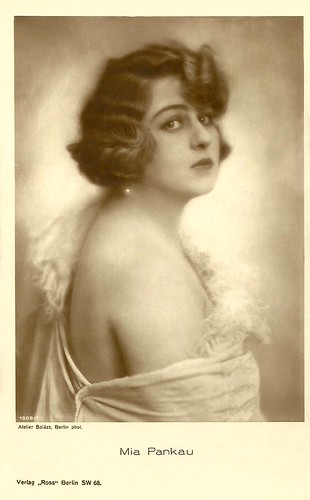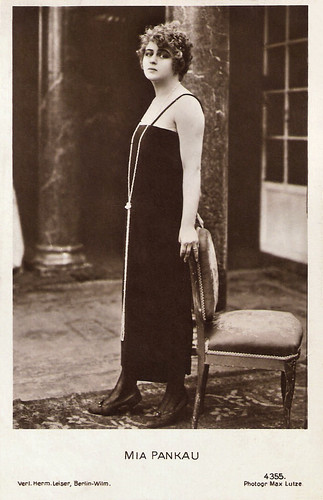
German postcard by Ross Verlag, no. 1031/1, 1927-1928. Photo: Atelier Balázs, Berlin.

German postcard by Ross Verlag, no. 1031/2, 1927-1928. Photo: Atelier Balázs, Berlin.

German postcard by Ross Verlag, no. 1755/1, 1927-1928. Photo: Atelier Balázs, Berlin.
When women love and hate
Martha Elisabeth Pankau was born in Friedland, Upper Silesia (now Korfantów in Poland), in 1891.
She made her film debut in 1917 in the film Wenn Frauen lieben und hassen/When Women Love and Hate (1917), directed by Dutch film director Jaap Speyer, with whom she would later marry.
Quite soon she was the leading actress in all of Speyer’s films of the late 1910s. They worked for such companies as Horos Film, Althoff & Co., and the Hamburg-based Vera Filmwerke. Their films include Heddas Rache/Hedda's Revenge (1919) with Reinhold Schünzel, Lilli (1919) and the sequel Lilli’s Ehe/Lilli's Marriage (1919).
In the early 1920s followed the two-parter Zügelloses Blut/Unbridled blood (Jaap Speyer, 1920) with Bernhard Goetzke, Entblätterte Blüten/Stripped Blossoms (Jaap Speyer, 1920), Die rote Nacht/The Red Night (Jaap Speyer, 1921) with Oscar Marion, Das blonde Verhängnis/The Blonde Fate (Jaap Speyer, 1921) opposite Ernst Hofmann, Jimmy, ein Schicksal von Mensch und Tier/Jimmy, a destiny of Man and Animal (Jaap Speyer, 1922), and Der allmächtige Dollar/The Almighty Dollar (Jaap Speyer, 1923).
Incidentally, she played in films by other directors such as Wolfgang Neff (Der Heiratsschwindler/The marriage swindler, 1922), Leo König (Die Hermannschlacht/The Battle of Hermann, 1924), and Friedrich Zelnik (Briefen die ihn nicht erreichten/Letters He Never Received, 1925).
She continued to work with her husband on the films Elegantes Pack/Elegant stack (Jaap Speyer, 1925), Die Moral der Gasse/The Morals of the Alley (Jaap Speyer, 1925) starring Werner Krauss, Hotelratten/Hotel Rats (Jaap Speyer, 1927) with Nils Asther, and Die drei Frauen der Urban Hell/The Three Wives of Urban Hell (Jaap Speyer, 1928).

German postcard by Verlag Hermann Leiser, Berlin-Wilm., no. 360. Photo: Greenbaum-Film. Mia Pankau and Aruth Wartan in Die Kraft des Herzens/The power of the heart (Jaap Speyer, 1918).

German postcard by Photochemie, Berlin, no. K. 2262. Photo: Mac Walten, Berlin.

German postcard by Ross Verlag, no. 1009/1, 1927-1928. Photo: Atelier Balázs, Berlin.
White slave trade
In the late 1920s, Mia Pankau appeared in supporting parts in such popular productions as Durchlaucht Radieschen/Highness radish (Richard Eichberg, 1927) starring Xenia Desni, and the Anny Ondra vehicle Der erste Kuss/The First Kiss (Karel Lamac, 1929).
Probably her best known is the fantasy/horror film Alraune/A Daughter of Destiny (Henrik Galeen, 1928) featuring Brigitte Helm. Pankau plays a prostitute who is artificially inseminated by a sociopathic scientist (Paul Wegener) with the semen of an executed murderer. As the result, the angelic Alraune (Brigitte Helm) is incapable of feeling any real emotions and kills all the men who fall in love with her.
Pankau easily switched from comedy to drama, from war film to horror film, but she had more difficulty switching to sound cinema. She appeared in a short sound film, Besuch um Mitternacht. Nachtgespenst in Berlin/Visit at midnight. The ghost of Berlin (Jaap Speyer, 1930), a film she co-produced herself.
After that she performed only in one sound feature: Tänzerinnen für Süd-Amerika gesucht/Girls For Sale (Jaap Speyer, 1931), again directed by Speyer. She was clearly not the big star any more, as the female lead had gone to Dita Parlo. Pankau played a matchmaker involved in the white slave trade, Parlo a young victim.
After that Mia Pankau retired from the screen. She died in Hoisdorf near Hamburg, Germany in 1974, at the age of 83.

German postcard by Verlag Hermann Leiser, Berlin-Wilm., no. 4355. Photo: Max Lutze.

German postcard by Verlag Hermann Wolff, Berlin, no. F.84. Photo: Alex Binder, Berlin. This postcard was sent by mail in 1924.

German postcard by Ross Verlag, no. 5528/1, 1930-1931. Photo: Böhm, Berlin.
Sources: Thomas Staedeli (Cyranos), Hal Erickson (AllMovie), Filmportal.de, Wikipedia and IMDb.
No comments:
Post a Comment